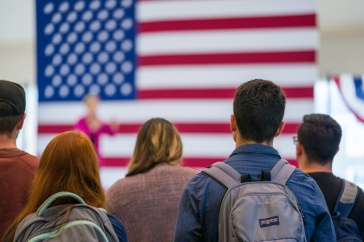Paula M. Salvio, professor of education and affiliate faculty in classics, humanities and Italian studies, and co-authors Bronwen E. Low and Chloe Brushwood Rose, have published a new book titled “Community-based Media Pedagogies: Relational Practices of Listening in the Commons.” The book is part of the Routledge Research in Education series and can be purchased online in eBook form.
“Funded by the Canadian Social Science Humanities Research Council, this comparative study of community media projects began with an interest in the kinds of stories people were telling in community programs through participatory, multimedia forms,” explains Salvio. “What might these stories tell us about the complexities of experiences of migration, marginalization, mobility and identity for their participants?”
Salvio and her colleagues worked with three groups: recently immigrated women in a leadership program in Toronto working with digital storytelling, youth with refugee experience in Montreal who were part of the mappingmemories.ca project, and youth at the Centre for Urban Pedagogy in New York City who use digital media, art and design to make educational tools that demystify complex policy and planning issues in their communities.
"Following our observations, interviews and reflection, we realized that we needed to complement our attention to the experience of storytelling with an examination of listening,” says Salvio. “In the group processes in these and other programs, including 'story circles,' one spends far more time listening than speaking. We realized that part of the power of these projects lay in their cultivation of listening relations, which supported participants in taking social and emotional risks. And so we began exploring the pedagogical and social significance of listening, and the role it might play in building a democratic, educational 'commons,' by developing a theory of intersubjective listening. This theory moves beyond dialogue to take into consideration the fundamental interdependence of speaker and listener, as well as the political and ethical complexities of such a listening."
Salvio’s research focuses on the cultural and historical foundations of education with a specialization in psychoanalysis, life-writing and the impact that marginalization, trauma and war have on women, children and youth in formal and informal educational settings. She explores transitional moments in history and society – reform, wars and revolution and their aftermaths – and how these affect the relations of education, culture and politics.
Salvio is currently completing a book titled “The Story-Takers: Transitional Justice, Public Pedagogy and Italy’s Non-Violent Protest Against the Mafia” (University of Toronto Press, fall, 2017). Her previous books are “Anne Sexton: Teacher of Weird Abundance”(State University of New York Press, 2007), and “Love’s Return: Psychoanalytic Essays on Childhood, Education and Learning” (Routledge, 2007, with Gail M. Boldt).
“Community-based Media Pedagogies: Relational Practices of Listening in the Commons” is now available online and in print.
-
Written By:
Paula Salvio | Education | paula.salvio@unh.edu | (603) 862-0024
















































